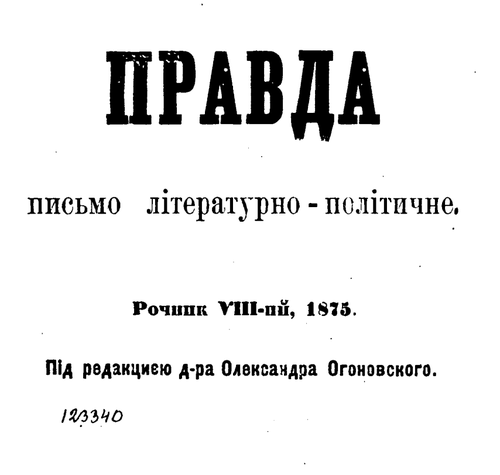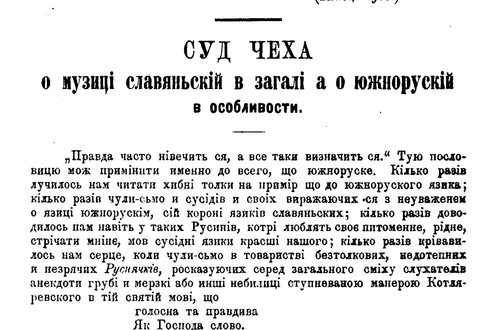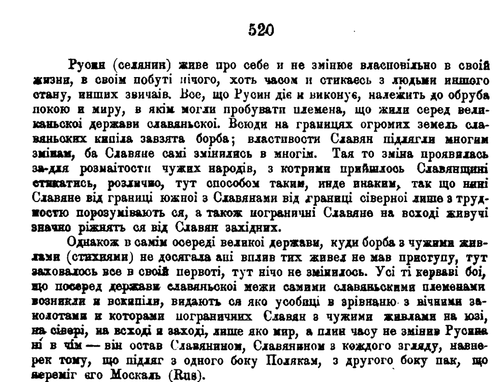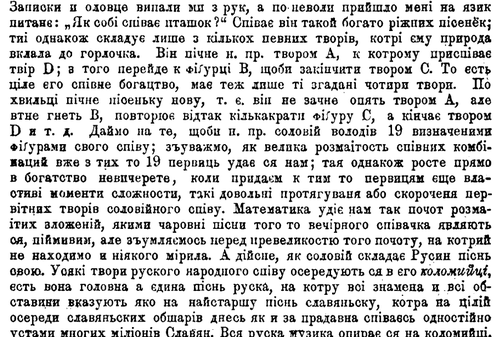СУД ЧЕХА
О музиці славяньскій в загалі а о южнорускій в особливости.
„Правда часто нівечить ся, а все таки визначить ся.“ Тую пословицю мож примінити именно до всего, що южноруске. Кілько разів лучилось нам читати хибні толки на примip щодо южноруского язика; кілько разів чули-сьмо и сусідів и своіх виражаючих «ся з неуваженем о язиці южнорускім, сій короні язиків славяньских; кілько разів доводилось нам навіть у таких Русинів, котрі люблять своє питоменне, рідне, стрічати мнінє, мов сусідні язики красші нашого; кілько разів крівавилось нам серце, коли чули-сьмо в товаристві безтолкових, недотепних и незрячих Руснячків, росказуючих серед загального сміху слухателів анекдоти грубі и мерзкі або инші небилиці ступневаною манерою Котляревского в тій святій мові, що
голосна та правдива
Як Господа слово.
Важка наруга, котру заподіювали отті нерозумні людці ріднему слову, пересувалась мов черв поганий по сніжній лилиі. И дійсно краса и милозвучність нашого язика и тогді визначувалась, так як відбиває краса лилиі від поганого червака соваючого по цвіту гидке тілище. Так, справді так діялось и дієсь межи нами. Сумні обставини, серед котрих зростаєм, у многих затирають почуствованє власноі гідности, спізнанє своєi народности и важкою уморою давлять так, що и самі не вспіють помітити тих грузів, якими несвідучо засипують народню святиню.
Богато взійшло и восходить из лона южноруского народа одличних писателів и инших славних мужів працюючих для других племен славяньских — а згадають-же хоч про них яко про синів южноi Руси?... А що вже и казати про тих „ревних" патріотів, що то у всім народнім, у людовій річи, рівняючи іі з старославянщиною або российщиною, бачуть все лише споpченє и „исковeркaнє“!...
Однакож „правда часто нівечить ся, а все таки визначить ся“. Краса нашого язика, яко язика народа мешкаючого в самім осередку земель славяньских, мовби в серци Славянщини, язика пребогатого, милозвучного и помежи всіми славяньскими орґанічно найвисше розвитого, хоть и довго запізнавана, в новійших часах найшла прецінь узнанє учених філололґів славяньских, а гадка, яку прорекли мужі глубокоі науки, згодом-перегодом почала ділати на загал, на вкорінені пересуди, розьяснюючи мов передсвіт темную мраку... А так, відай, єще и в наше віконце заблисне колись сонце, відай лучша дoля ожидає наш язик, а грядущі віки дивоватимуть ся, як міг язик такий красний пак довго бути в занедбаню и запустіню. Як би и упостачувались обставини, в нас увіренє кріпке, що недалекий може вже час, коли наша Русь южна буде предметом пильних студий у всіх Славян. Доселі однакож стрічали-сьмо — з немногими висмками — досить байдужести у Русинів до свого ріднёго, а у племен нам посвоячених, именно у сусідуючих з нами, богато недовіря ба навіть ворогуваня до всего, що зве ся южноруским. Тим приятнiйше вражiне зробила на нас статя п. Макса Кононаска, поміщена в „Нudebnich Listech" (Листах про музику) за р. 1874, а також и оцінка тоi статьі поміщена в ческім письмі „Svĕtozor“ р. VIII. 1874, де висказуєсь великоі досяглости правда и подає объєктивно осуд нашоі народнёі южнорускоі музики.
Нечисленний але бодрий народ ческий видав вже богато учених, занимаючих ся всею Славянщиною а бистроумно проглядаючих важні питаня, які мали в будущині виникнути в світі славяньскім. П. Конопасок править про общу музику славяньску, визнаваючи тиі принципи, що з музичного лише тоє, що з народа походить, мусить бути ужитим за підвалини, на котрих з успіхом мож збудовати відомство народне. Що до питаня, як належить плекати музику славяньску, голосить, що вже в самім початку треба Чехам прямовати к розвитю музики славяньcкoі. Треба, каже, збирати невтомно всякі мелодиі народних пісень славяньских, а маючи материял о скілько мож найбогатший, мелодиі упорядковати, а тогді природно вивинесь мелодия, на котрій слідує класти закладини гудьби славяньскоі. Збираємо протоє, що нам під рукою виростає на основі співу народнéго, нові мелодиі, збираємо про тоє, що наші побратимці Славяне з залюбованєм плекають на поли своєi племінноі музики (hudby kmenové), ба и тогді, коли вони вже й упорають ся з своєю працею, ми заєдно збиратимемо. В тім разі однакож, коли поодинокі племена славяньскі матимуть після матернеі свосі мови також власну музику свою, тогді вже и бесіди не може бути о музиці всім Славянам общій. Неуступність, з якою кождий Славянин супротив „братям" придержуєсь свого, єсть историчне знамя. — Дальше звертаєсь шановний автор до питаня, де шукати прaвoі музики славяньскоі, и виводить и ви казує як на долони, що славяньска музика в цілій своїй чистоті й правоті задержалась у племени южноруского, поселеного в осередині огромих земель славяньских, куди чужоземні, неславяньскі впливи не могли мати приступу. Цілий уступ трактуючий о музиці южнорускій вельми важний для всіх Славян в загалі, а для нас Русинів в особливости, Тому то и подаємо єго майже в дословнім переводі.
„Гадаю,” говорить п. Конопасок, „що найстарша а власне єдино права славяньска музика, именно тота музика, котра від прадавна с. є. вже перед утворенєм держави велико-моравскоі обща була всім Славянам, що тота музика єсть доceгоднішня музика руска (dosavádni hudba rusinská). Хоть и виявляю тут свій незрушний пересвід, заховую собі в слідуючих строках висказати о тій річи по крайній мірі яко о до гадці, а вельми жичу собі, щоби те, щó тут подам яко догадку, лишено було яко питанє до розвязаня мужам званим, именно дієписцям, філолоґам, и др. На певне покладаю, що моє мнінє іх вироки в будучности потвердять.
Думка в мене така, що все славяньске, яким воно мусіло бути в своій первітности, могло заховатись лише в щепі рускім (u kmene rusinskeho) без переміни аж до сегодня — и що кождому Славянину путeвати к людови рускому, сли хоче з власного вида и слуху набути, свідомости о тім, хто були єго прапредкове, як жили, як думали и чуствовали, як говорили и співали, як живились и одягались, який був іх побит домашний, які мали звичаі и обичаі. Все те можна яко у самого жерела студиёвати лише еще між людом руским, з вислідком всюди однаким, так само в оселях найбільше віддалених по склонах Карпатских, як в кождім пробутку рускім від Сяну аж по Дністер, Дін и Дніпро; як в низинах подільских так у Гірняків, Гуцулів, так у всіх Козаків — всюди помітити те саме. Суть де які одміни, то має се причину лише місцеву. В засновах єсть собі все руске, як в Подолі и в Волині, так в Украіні и в Козаччині аж на волос. Велика тая часть Славяньства має скрізь тую самую музику, а тая єсть в заснові ино сама одна піснь народна. Се дуже запопадним показом, котрий мусить взбудити найбільший подив, коли зважимо, що Русин уважає за вітчину місце, де зродив ся, що правий Русин з низшoі верстви люду не знає окрім тоі своєі батьківщини з прочого великого світу нічого, и що самий верх щастя тут на земли бачить в тім, коли доля зволить єму батьківщини ніколи аж до смерти не опускати.
Люд кільканайцять-міліонний, межи котрим розлягаєсь лише один єдиний спів — ані о собі не знає. Хто вчив весь той люд тоі єдиноі, тоі общоі пісни та в котрій добі?
Сли є що на світі, що би людский розум оторопило, вірю, щоби то мусіли бути подібні питаня. Русин не вміє читати, не вміє писати; щó так принагодно вчує в корчмі о злучаях своєi околиці, як о бувальщині так о теперішности, тоє стає єму дієписю всемирною. Єго єдиною школою єсть церков. Що тут чує священика відправляючого в неділі и свята, за тоє платить; тому також приймає тоє одним ухом, щоби другим випустити; а до того єсть се рік-річно ціліський час без переміни завсігди те саме. Окрім священика не має Русин иншого вчителя. Що „там єдворі” говорять и діють, де польский пан сидить, те все уважає Русин за надто польске, схитріле, нещире и всему тому не вірить. Кождого иншого чоловіка в сурдуті, коли зайде такий до єго батьківщини, Русин найрадше оминає. Знає він добре, що то не буває звичайно ніхто другий, як якийсь галапас (паразит) канцелярский (kancelafsky holič), котрий цілить на єго кешеню або доконечне шукає в люді „кервавoі даниня".
Русин (селянин) живе про себе и не змінює власновільно в своій жизни, в своім побуті нічого, хоть часом и стикаєсь з людьми иншого стану, инших звичаів. Все, що Русин діє и виконує, належить до обруба покою и миру, в якім могли пробувати племена, що жили серед великаньскоі держави славяньскоі. Всюди на границях огромих земель славяньских кипіла завзята борба; властивости Славян підлягли многим змінам, ба Славяне самі змінились в многiм. Тая то зміна проявилась задля розмаітости чужих народів, з котрими прийшлось Славянщині стикатись, розлично, тут способом таким, инде инаким, так що нині Славяне від границі южноі з Славянами від границі сівернoі лише з трудностю порозумівають ся, а також пограничні Славяне на всході живучі значно ріжнять ся від Славян західних.
Однакож в самім осереді великоі держави, куди борба з чужими живлами (стихиями) не досягала ані вплив тих живел не мав приступу, тут заховалось все в своій первоті, тут нічо не змінилось. Усі ті керваві бoі, що посеред держави славяньскоі межи самими славяньскими племенами возникли и вскипіли, видають ся яко усобиці в зрівнаню з вічними за колотами и которами пограничиих Славян з чужими живлами на юзі, на сівері, на всході и заході, лише яко мир, а плин часу не змінив Русина ні в чім — він остав Славянином, Славянином з кождого згляду, навне рек тому, що підляг з одного боку Полякам, з другого боку пак, що переміг єго Москаль (Rus).
Чужі живла єго не дотикались ніколи, а понеже з власного наклону Русин прямо не мінить ся, то и остав до днеська таким, яким був первітно — Славянином. Розуміє ся, що говорю лишень о рускім люді сільскім, серед котрого и глядати пісни народноі. Руска шляхта перейшла на однім боці до табору лядского, на другім боці пак змосковщилась (poruštila), що и було причиною, що так многа річ без дяки уступити мусіла раз натовпу польскому, то знов впливови московскому. Лише пісня руска уживала завсe у всіх обставинах повноi свободи, а про те заховалась аж по тую хвилю в первітній свіжести.
Те дивне захованє єдиноі пісни було лише можливе в самім осередку славяньскоі держави. Коли-б лише одна часть середного Славяньства була припустила зміни своєi пiсни, а коли-б тая зміна була удалась ино з одним тоном тоі-ж пісни, то би могло се пригодитись лише в неспокійний час усобиць піднятих межи племенами славяньскими, а руска народна піснь обьявляла би ся нині по крайній мірі в двох одмінах. Але Русини співають аж до сегодня на всіх місцях лишень ту одну одностайну піснь.
З того виходить на яв, що тая піснь, котра перетрівала всякі пригоди в народі рускім, начало своє мати мусить в найстаршім, в правікім Славяньстві. Руска піснь творить закладини народноі гудьби словіньско-угорскoі, народнёі гудьби юго-славяньскоі, ба и гудьби московскоі. Вона обіймає в собі тонові твори, спільні всім народним пісням угорским, сербским и московским, а хто би міг о тім похибовати, що тиі первиці славяньского народного співу були колись майном и Чехів и Ляхів? Що в плині часу цілого може тисячелітя вмішалось до славяньскоі вдачі в музиці також dur, те нам ніяк на шкоду. Ми Чехове и Ляхове утужніли під тяготою важкоі судьби так, що мягка наша вдача переміниласьв dur. Руска піснь остала напротив тому в своій славяньскій первітности, то єсть остала наскрізь moll. У Югославян вже и у Россиян починають нестало мінитись оба тонові роди.
Був час, коли я при студиёваню славяньских пісень народних, рівно як кождий инший, звернув головно увагу к множеству и розличности іх, а так сталось, що жертвовав цілі два роки (1859 — 60) збирaню пісень руских. Кождий Русин з-окрема знає теж крімовоі головноі а всеобщоі народнёі пісни, котра ніколи не зміняє ся, про власну потребу єще також піснь свою домашну, т. є. околиці, де родив ся. Один і співає так, другий инак, а на кождім місци учуєш іі инакше. Я був досить неповоротним, щоб успів узбирати всі тоті пісни, яко славяньскі народні співи. Одного вечера однакож, коли наслухав ся співанок працюючого гончаря и в нотах собі іх помітив, розьяснилось мені в умі нараз. Записки и оловце випали ми з рук, а по-неволи прийшло мені на язик питанє: „Як собі співає пташок?“ Співає він такой богато ріжних пісенёк; тиі однакож складує лише з кількох певних творів, котрі єму природа вклала до горлочка. Він пічне н. пр. твором А, к котрому приспіває твір D; з того перейде к фіґурці В, щоби закінчити твором С. То єсть ціле єго спiвне богацтво, має теж лише ті згадані чотири твори. По хвильці пічне пісеньку нову, т. є. він не зачне опять твором А, але втне гнеть В, повторює відтак кількакрати фіґуру С, а кінчає твором D и т. д. Даймо на те, щоби н. пр. соловій володів 19 визначеними фіґурами свого співу; зъyвaжмо, як велика розмаітость спiвних комбінаций вже з тих то 19 первиць удає ся нам; тая однакож росте прямо в богатство невичерете, коли придаєм к тим то первицям єще властиві моменти сложности, такі довольні протягуваня або скороченя первітних творів соловійного співу. Математика удіє нам так почот розмаітих зложеній, якими чаровні пісни того то вечірного співачка являють ся, піймивим, але зъумляємось перед превеликостю того почоту, на котрий не находимо и ніякого мірила. А дійсне, як соловій складає Русин піснь свою. Усякі твори руского народного співу осередуються в єго коломийці, єсть вона головна а єдина піснь руска, на котру всі знамена и всі обставини вказують яко на найстаршу піснь славяньску, котра на цілій осереди славяньских обшарів днесь як и за прадавна співаєсь одностійно устами многих міліонів Славян. Вся руска музика опирає ся на коломийці, а коли не суть всі моі попередні аргументациі хибні, то може єдина коломийка уважаною бути за первий и угольний камінь в славяньскій музиці. Тота первітна славяньска музика є наскрізь рода moll-oвoгo. Кождий Славянин запевно чує як я, що в характері славяньскім (v pо vaze slovanské) тоє мусіло визначитись, а проте єсть дуже добре, що у Чехів и Ляхів розвинув ся — можемо сміло речи: наслідком историі — такий род dur-овий. Нині же кождий з наших музиків, котрий працювати знаміряє для гудьби славяньскоi, нaй бачить, де и в кого єму студиёвати оба тоті характери музичні. А велика ріжниця межи оним moll, котрого уживають на заході Европи, а нашим славяньским moll. Там уживають єго то задля модуляциі, то задля лагідного переходу довго тріваючого dur, або в ціли викликаня ефекту. Наше moll однакож є глубоко чуствове а рівномірно проймаве. Там проявляє ся лише з причин майже введених, у нас же є вицвітом природного, внутренного чуства. — Так Славянин співає собі способом, який примічаємо у півців окрилених в природі т. є. подоби єго пісни почивають на тих закладинах, які Творець вложив у вдачу співу пташиного. Для того то дійсне не прорекаємо гадки надто смілоі и пересадноі, коли скажемо, що Славянин собі співав вже тогді, коли крім пташини в цілім світі жадного єще не було учителя співу. А тим и вивернено прямо все, щó ино говорили и говорять о впливі, який мало мати християньство при введеню у славяньскій земли на правий спів народно-славяньский.“
В десятім и посліднім розділі своєi статі подає п. Конопасок в нотах визначене славяньске коло (руску коломийку), найперше в творах найбільше поєдинчих, первітних, потому з декотрими оздобами и варияциями, як се проявляє ся межи людом руским. Статя ціла, написана основно и з залюбованєм до предмету, свідчить вимовно о авторі. Виреченє єго сміле а правдиве вельми нас урадовало, але як нам и приятно, що брат-Чех шильно збирає наші рускі мелодиі, цінить іх и любує ся ними, так знов з другого боку сумно нам становилось, чому то ми самі, живучи посеред нашого люду, переховавшого так богато дорогоцінних пер виць славяньских, не взялись як слід до збираня наших безчисленних, пречудових мелодий. Знаю з досвіду, що кожде майже село має властиві варияциі пісни народноі. Тож до праці кождий Русин, що знаєсь на музиці! Збираймо мелодиі о скілько мож з кождого села и видаваймо іх хотьби и невеличкими збірниками яко материяли до закладин музики славяньскоі, для прослави руского имени и Славяньщини. А дасть Біг, удійстнить ся велична гадка піднесена нашими побратимцями Чехами, постане музика славяньска. А музика, як каже п. Конопасек, то нічо иншого, лише мова, мова чуства, так як річ язикова мовою єсть розуму. Музикою переносимо до душі слухателя тоє, що чуємо, а річю тоє, що мислимо. Тож коли судьба розділила и розпорошила Славян так, що говорять ріжними говорами, що поодинокі щепи виплекали окремі літератури а діти одноі колись матери язиково тепер лиш з трудностю порозумівають ся — най хоть в музиці зъєдиняться, най вспільну мають мову чуства!





